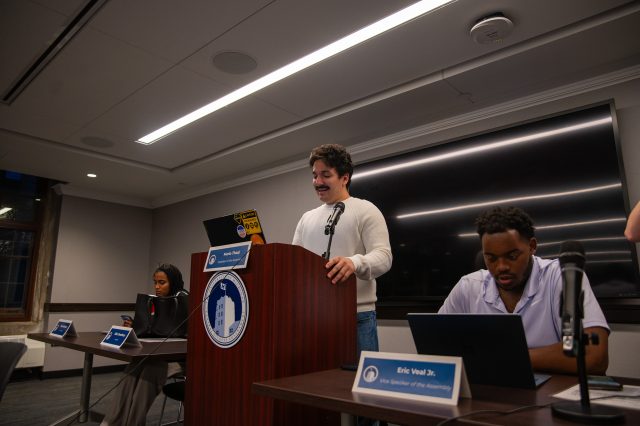[ad_1]
The University of Michigan Central Student Government convened in the Michigan Union Wolverine Room Tuesday evening to pass resolutions regarding the ex-officio appointment process and a new Textbook Transparency Act focused on making course materials more accessible. The Assembly also heard the introduction of three new resolutions, covering policing transparency, academic programs and potential scholarships.
CSG unanimously passed two resolutions, Assembly Resolutions 14-031 and 14-035, or the Textbook Transparency Act. AR 14-031 is a procedural resolution that clarifies how ex-officio members of CSG are appointed, specifying the role of the Executive Nominations Committee in reviewing the Assembly Speaker’s nominations for these positions.
AR 14-035 is a joint call made by CSG, the U-M Dearborn Student Senate and the U-M Flint Student Government asking University administration and faculty to commit to include textbook and material costs to students as part of course syllabi. The resolution aims to lower the burden of additional costs for students by asking faculty members to attempt to make PDF versions of textbook readings available.
Members of the Assembly also introduced three resolutions that will be moved forward to the Resolutions Committee, the group of Assembly members that determines the wording of a resolution before it is voted upon.
AR 14-036, the Transparency in Policing Act, was introduced by one of its sponsors, Erin Neely, vice chair of the Rules Committee. The resolution demands that the U-M Division of Public Safety and Security and the Ann Arbor Police Department release body camera footage and written reports relating to the removal of the U-M Gaza solidarity encampment on May 21. The resolution also includes demands for policy changes to prevent future instances of officers turning off body cameras. The resolution comes in the wake of an investigation by The Michigan Daily which found that AAPD officers deactivated body-worn cameras while patrolling DPSS’s sweep of the Gaza solidarity encampment.
Introducing the resolution, Neely said she hoped the need for such an act would be something that CSG could agree on due to the relevance of the issue for the student body as well as the importance of police transparency more broadly, citing the University’s denial of a Freedom of Information Act request by The Daily in the investigation.
“I think this issue is pretty important to the student body, and it should be able to generate, hopefully, trans-partisan support because we should all agree about accountability in policing, and if (AAPD) are deliberately turning off their cameras or refusing valid FOIA requests from The Michigan Daily under flimsy excuses, that is a problem,” Neely said.
Assembly members also introduced AR 14-037 and 14-038. AR 14-037, the Labor Studies Act, would call upon the University to create a new labor studies minor as well as a Labor Studies Center which, according to the proposed resolution, would provide students an opportunity to understand labor movements, including labor activists, and how they influence the economy.
AR 14-038 proposes the establishment of a Scholarship Study Task Force oriented around creating scholarship opportunities for students who identify as refugees or conflict-impacted. The task force, known as CARES, would be responsible for coordinating this effort with the University’s administration and clarifying its feasibility.
Assembly members asked CSG President Alifa Chowdhury, who has not attended recent CSG Assembly meetings, about progress made by the executive committee. In her executive report, Chowdhury described recent efforts by the executive committee to pass a budget to send aid to Gaza.
“We’re working on passing a budget to allocate $440,000 to go to Gaza,” Chowdhury said. “I think that’s been taking a lot of work and effort and time.”
LSA senior Mario Thaqi, speaker of the 14th Assembly, clarified that the office of the Dean of Students would temporarily fund the Airbus program, which will provide access to the Detroit Metropolitan Wayne County Airport for students during Fall Break.
CSG also heard reports from other committees at the meeting. Hayley Bedell, director of CSG’s Elections Commission, noted in her report that there are currently eight open LSA representative seats, as well as one for the Ross School of Business, in the wake of the recall of two members, Sasha Amani and Faizaan Aziz, at the meeting for having accumulated more than the permitted number of absences from CSG assembly meetings.
Former Business representative Amani was recalled after a debate at the start of the meeting for missing more than the number of permitted meetings within a term. Aziz was recalled for having failed to attend any assembly or committee meetings since his appointment.
During the section of the meeting dedicated to community concerns, LSA senior Ella Mannino urged CSG to consider what they can do to encourage the University to improve its math programs, which are often a source of frustration for students.
“Our advocacy should not stop at these Tuesday meetings,” Mannino said. “If a few of us can get together and come up with some ideas to encourage the University to improve its math program — perhaps other notoriously brutal programs — and make things a bit more fair for the students, I’m all ears and voice.”
LSA representative Shawn Kelly expressed his agreement with Mannino, citing apparent discrepancies between sections of the same course in terms of support for students.
“I feel like the lack of uniformity in terms of support within the math department and people taking math courses is a big problem, and this has been a problem for a while,” Kelly said. “Even The Daily has reported on it, and there have been really no major changes or even a recognition of the problems within the department.”
Daily Staff Reporter Bronwyn Johnston can be reached at jbronwyn@umich.edu.
Related articles
[ad_2]
Source link











